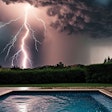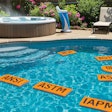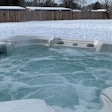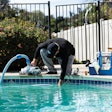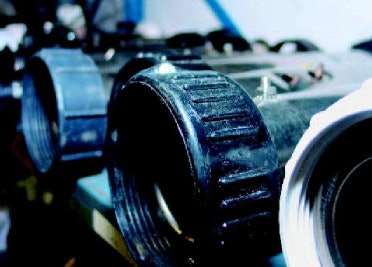
With an eye on increased customer satisfaction and sales, the makers of hot tubs and hot tub parts have been busy working to increase reliability and decrease the number of service calls on heaters, blowers and pumps. At the same time, retailers are struggling to find qualified personnel to diagnose and remedy problems with the equipment, with many considering their spa service departments a "necessary evil" rather than a source of revenue. They, too, would like to see spa service simplified and made more efficient and profitable, whether they service only what they sell or work on a wide range of models.
Although no panacea appears imminent, potential cures for specific problems are being developed and discussed, including increasing technicians' education, and taking techs out of the troubleshooting business by making the equipment "smarter."
Brave New World
In some ways, the industry is experiencing the same growing pains the auto industry did when cars went from relatively simple mechanisms that shade-tree mechanics could fix to complex systems controlled by computers. Newer cars required a whole different set of skills, and some garages lagged behind others in their ability and education and lost customers to more modern shops.
Hot tubs service departments are headed down the same track, some experts say. The process began almost a decade ago when spa controls went from primarily pneumatic to electronic.
"There was a comfort level with pneumatic: If this doesn't work, check this. If it's not that, check this, etc." says Rob Santos, special projects manager for Cal Spas in Pomona, Calif. "But today technicians don't need to do so much technical troubleshooting in the field.
"It's a change in thought process. Rather than going against technology, they need to embrace it. It's a lot more efficient way to run your business, and eventually everyone will be happy with it."
Balboa Instruments, Tustin, Calif., is one control maker that's embracing such technology by focusing on helping spa repair technicians get to the bottom of problems without spending a lot of time in customers' backyards. The company's SpaConnect is a remote diagnostic tool that technicians can connect with from the job site. And not only does it tell users what's wrong with what, but it can actually walk them through a repair, step by step.
"It will help the tech determine whether the problem is a pump, a blower, a heater, etc.," says Kelly Hanna, marketing communications manager. "The service pro goes out to the home and connects to an Elite Service Module using a cell phone or PDA."
This diagnostic tool was developed to help both service techs and OEMs, according to Hanna.
"It eliminates the service tech having to go out there and tear the whole thing apart, and sometimes enables them to make a single call and solve the problem," she explains. "For the OEM, it's beneficial because they're not getting whole systems returned for replacement when it's just something like a fuse that's not working."
Another leader in controls, Gecko Electronics, recently developed the aeware brand, also with service technicians and OEMs in mind. In addition is addresses dealers' difficulties finding qualified people to service spas.
"We wanted to create a control that would diagnose the equipment and tell the user what had failed," says Gary Nugent, leisure water sales manager for Gecko Electronics, Quebec City, Quebec. "In our industry, some areas might not have a qualified guy on hand for diagnosis and repairs, and we took that into account."
The controls monitor the amp draw at each output and compare it with baseline values that are set in the factory. Every time the spa is turned on each output is compared to its baseline value.
"So now the tech doesn't have to take the control apart," Nugent adds. "He just looks at a display, which tells him where the problem is, then he looks at the device itself, and if it's not working, he swaps it out for a new one. He still has to verify first that it's not another problem, but what it does is eliminate the need for the technician to do a lot of electrical work with the meter."
It also enables the homeowner to tell the service department what's wrong so it can send the appropriate parts for replacement.
"You're still going to have to dispatch a man, but at least you'll send him to the yard with the right part," he says. "Otherwise you'd have to bring everything in the store and probably make two trips."
These changes also help to reduce the time a technician spends at the site, thus allowing for more calls and increased customer satisfaction.
"The fact is you want to provide the best possible service and you don't want the guy out there for hours on end trying to solve a problem," says Santos. "Now you can go out there and within 10 minutes diagnose the problem and decide whether or not you've got to switch a part out.
"Besides, it's a lot more efficient and there are generally a lot fewer parts switched out in the process. Back when pneumatic controls were used, you'd keep replacing parts until you found out what was wrong. Now there are basically three parts: the control, the heater and the pumps. That's the whole tub."
Destination Education
Smart controls can certainly help dealers diagnose problems and suggest fixes, but smart employees are even more important.
"As long as there are parts on spas, the parts and repair business is always going to be there," says Ralph Raub, president of Horizon Spa and Pool Parts, Tucson, Ariz. "I don't see technology as taking away jobs; I see it adding them. But you're going to need more education.
"It would be nice if we had a trade school, but at this point we don't. The manufacturers have their own tech schools for their products, and that helps. Also, the NSPI Tech program has been wonderful, but it's only the beginning of what's needed."
Companies like Spa Parts Plus are trying to bridge this gap in industry education by offering technical seminars at trade shows. Willie Wise, technical director for the Prescott, Ariz., parts distributor, will hold such a seminar at the AQUA Show in November.
"We try to teach troubleshooting instead of the specifics of each manufacturer's equipment," he says. "An educated staff is your best asset."
Dennis Maddox, president of Maddox Enterprises in Santa Maria, Calif., agrees. He believes that half of the service calls an average dealer makes could be avoided if everyone were properly trained, not just the ones making the house calls.
"The most important person for reducing the cost of service is the person answering the phone," he says. "I'd rather have the most knowledgeable guy answering the phone because he can tell the service people to bring a pump or an air valve or whatever's needed. If the person answering the phone doesn't know enough, he'll send the service guy out with everything.
"Unfortunately, it usually doesn't work out that way. People usually begin to learn by answering the phone, and that causes lost time and money."
Well-Equipped Workforce
Of course, the fanciest diagnostic equipment and the most technically and mechanically minded employees in the world aren't enough to ensure an efficient and successful service department. Having parts on hand or the ability to get them from a distributor quickly is equally important.
"Spas are not getting any cheaper, and people want them fixed when something goes wrong," says Raub, who started in the spa retail business almost 30 years ago before becoming a parts distributor. "People didn't want the down time while I waited for a part when I was in the retail business. That just doesn't .y. You've got to have parts on hand."
Stocking parts is much easier when you narrow down the number of spas you're willing to work on. Many won't service what they don't sell, which makes stocking parts easier but leaves many potential customers out in the cold, according to Raub.
"There are a lot of similarities and differences between the brands, but you can troubleshoot any spa if you have the knowledge. And if you're going to be successful in spa service, you're going to have to diversify."
Flohr Pools, in Chambersburg, Pa., services only what it sells. Mark R. Flohr, president, says the reason is the difficulty involved in servicing spas you don't have parts for.
"We turn away as much business as we actually do," he says. "I'm not saying it's not a good idea for somebody else, but it's not for us."
On the other hand, Shaun Hennessey, a spa technician with Pool & Patio Center in Coventry, R.I., believes that properly trained and educated technicians can service almost any spa. The key, he says, is having the parts.
"I have a brand-new van I just outgrew," he says. "You have to carry a lot of parts when you're servicing other people's equipment instead of your own."
Diminishing Returns
Is it better to repair or to replace?
When cars get older and small repairs begin to mount, people are constantly forced to make decisions. Should I replace the air-conditioner for $500 when the car is only worth three times that or just get a new car. It's never an easy call to make. You've got to consider the cost of the repair and the likelihood that something else will break down vs. the cost of a new car.
Hot tub equipment is very similar. Heaters break down, pumps burn out and filters falter. When is the equipment worth repairing and when are you better off with all new. It depends on a number of variables — and also on a person's bias. Some say,
"Take it all out and replace it," while others are more inclined to fix what's wrong and leave the working equipment alone.
Tim Loomis, sales and marketing director for Spa Parts Plus in Prescott, Ariz., is in the former camp. Willie Wise, the company's technical director, is in the latter. Here's what they had to say on the matter.
Loomis: "By changing out the equipment pack a service guy is less likely to get called back. Say he goes out one week to fix the heater, then he gets called back for the blower a week later. From the customer's point of view, the service tech must not have done the job correctly the first time. So by replacing the whole pack, he fixes any incoming problems and keeps the customer happy.
"I like to say to the customer, 'If anything goes wrong with the equipment in the next two years, all you owe me is a glass of iced tea.'"
Wise: "If the equipment has reached a certain point, it should be replaced. But some tech who aren't as educated as they should be replace all the equipment when it doesn't need it because they don't know what else to do.
"The fact is, I am against having a sealed box for the circuit board where you can't fix anything on it. That leads to throwing out perfectly good components. It's an education and training issue.
"If the heater burns out there has to be a reason, and that also needs to be addressed. If it's a filtration problem, changing the heater isn't going to fix it."
Loomis: "We have different views. I agree that education is good, but there's value in replacing everything. For the service guy, replacing everything gets it up to about a $1,000 job. So he gains revenue. The customer benefits, too, because now he's got, in essence, a brand-new tub with a two-year warranty. That's a real selling feature."
Wise: "Yeah, and the manufacturers are trying to make their controls and equipment function like an appliance, where you get rid of it once it stops working. The reason they do that is because the techs in the field aren't capable. But a better-trained workforce would be better able to make those repairs.
One of the problems — and I've heard this time and again — is that service is a necessary evil. There's no place you can go to to learn to work on spas. You can't go anywhere to learn it all. That's what makes it so difficult."
Loomis: "Willie has a 1964 Bel-Air, so you can understand why he's in the camp of fixing the parts instead of replacing the whole."
Wise: (laughter)
— B.K.





































